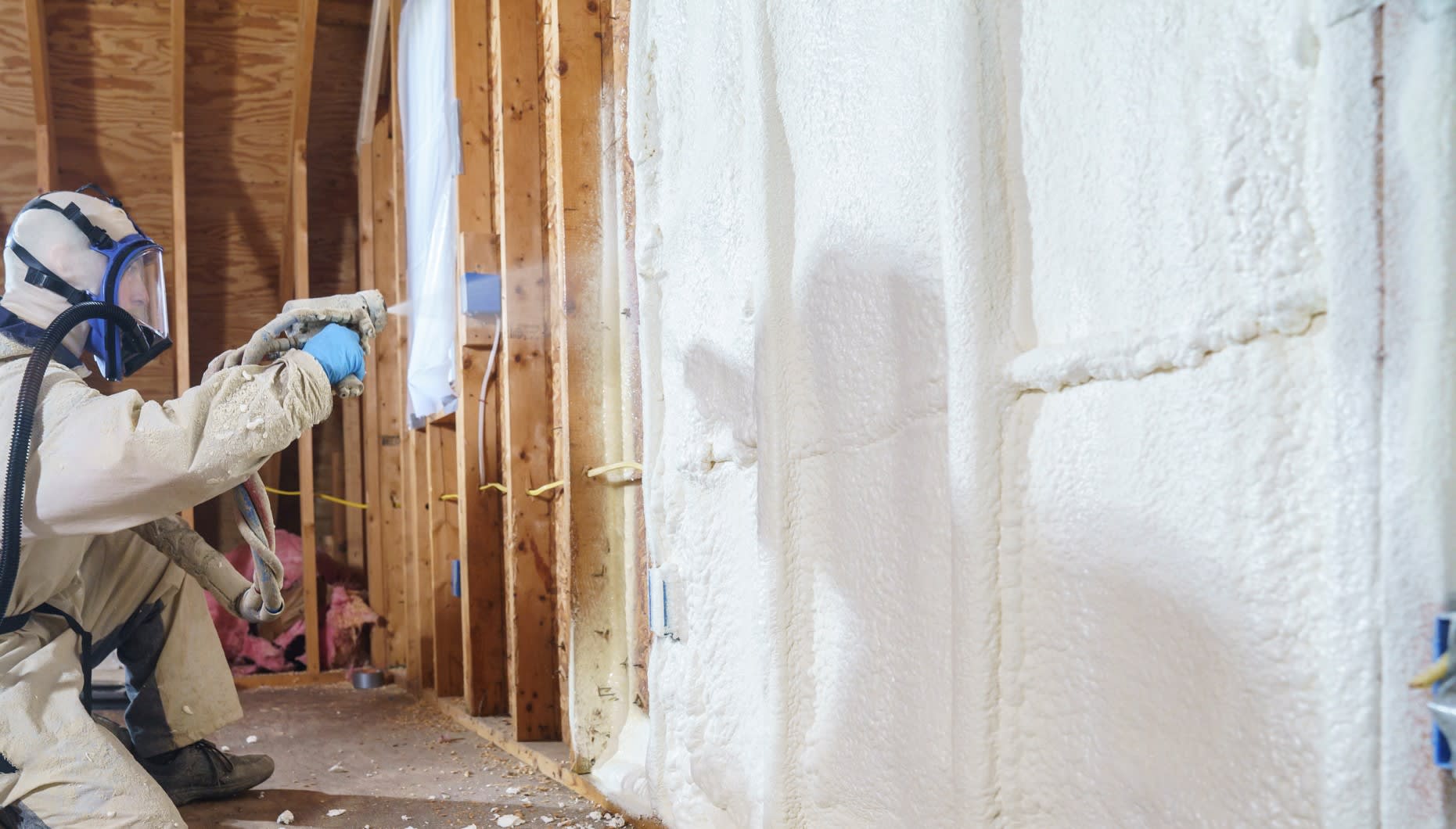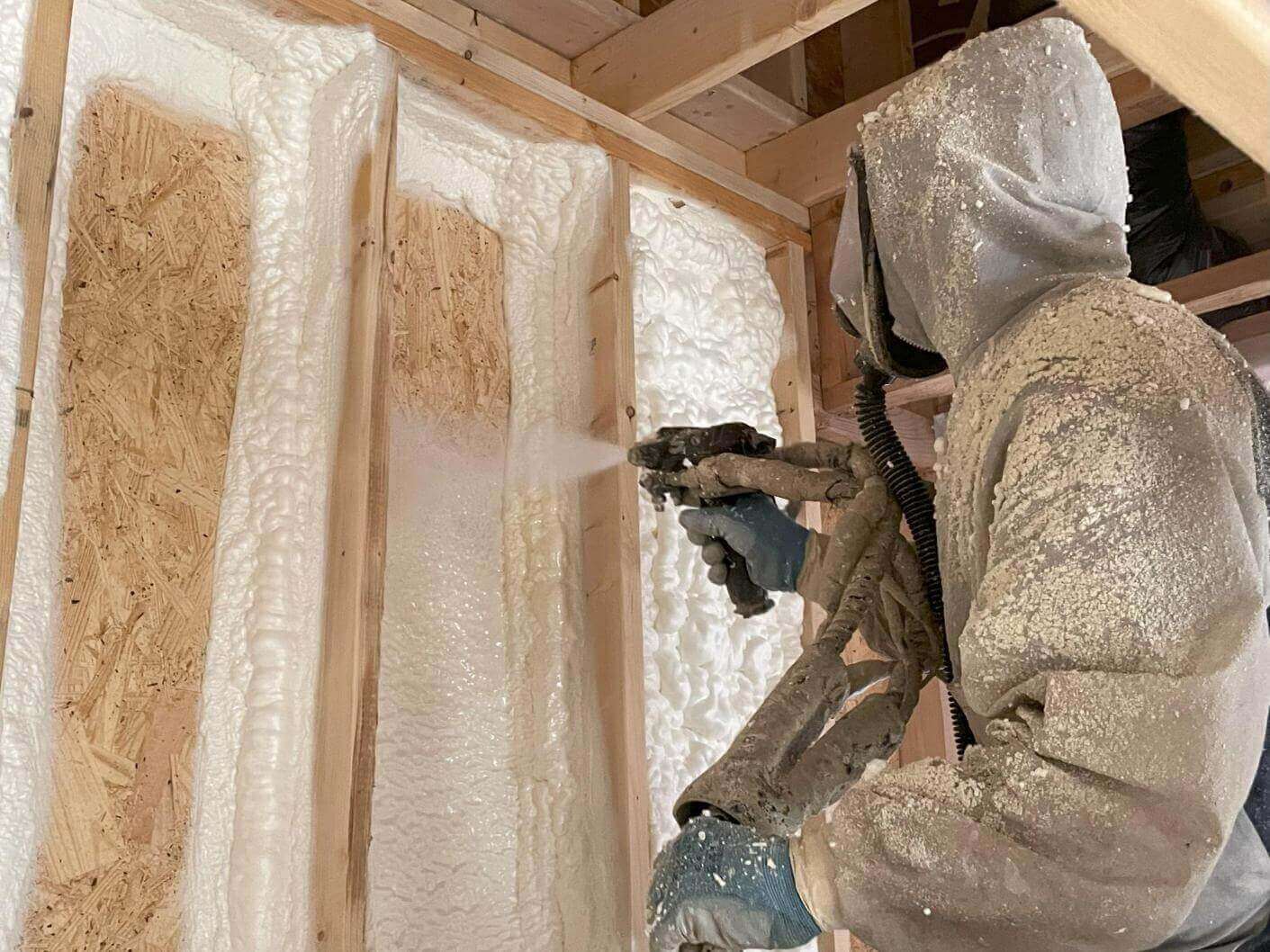Spray Foam: The Ultimate Service for Air Sealing and Insulation
Spray foam insulation has emerged as a leading option for efficient air securing and thermal insulation, using a special mix of properties that establish it apart from conventional approaches. Its ability to expand and load gaps makes it especially reliable in preventing air leak, which can significantly impact power efficiency. Understanding the complete scope of its advantages, installation processes, and contrasts with other insulation types is important for making informed choices. As we explore these facets, the effects for both brand-new constructions and retrofits come to be progressively considerable. What aspects should influence your option?
What Is Spray Foam?
Spray foam is a versatile insulation product that incorporates the concepts of air sealing and thermal resistance to improve energy performance in structures. Composed primarily of polyurethane or various other comparable compounds, spray foam is applied as a liquid that expands upon call with surfaces, creating a strong, continuous layer of insulation. This one-of-a-kind home allows it to load gaps, fractures, and voids that traditional insulation products might neglect, offering an exceptional air seal.
There are two primary types of spray foam: open-cell and closed-cell. Open-cell spray foam is lighter and a lot more versatile, providing exceptional audio absorption and a reduced R-value per inch - Spray Foam. In comparison, closed-cell spray foam is denser, supplying a greater R-value, moisture resistance, and added architectural honesty to developing elements
The application procedure generally involves specialized devices, ensuring a smooth application that sticks to various substrates, consisting of timber, steel, and concrete. This versatility makes spray foam ideal for both brand-new constructions and retrofitting existing frameworks. Its capability to produce an impermeable barrier substantially adds to minimizing power usage and improving interior air top quality, therefore making it a recommended choice amongst home builders and home owners alike.
Benefits of Spray Foam Insulation
Among one of the most considerable benefits of spray foam insulation is its phenomenal capacity to create a constant air obstacle, which effectively reduces power loss. Unlike typical insulation materials, spray foam broadens to fill up voids and fractures, making certain that air leakage is substantially lowered. This particular not only enhances energy efficiency but also brings about decrease energy expenses with time.
In addition, spray foam insulation offers remarkable thermal resistance, adding to a more secure indoor setting. Its high R-value per inch permits for efficient insulation in constrained rooms, making it optimal for attics, wall surfaces, and crawl rooms. The moisture-resistant homes of spray foam help prevent mold and mold growth, advertising much healthier living conditions.
An additional vital advantage of spray foam insulation is its sound-dampening top qualities (Spray Foam). It effectively lowers sound transmission in between areas, creating a quieter and a lot more comfy home environment. The sturdiness of spray foam also sticks out, as it does not droop or clear up with time, preserving its efficiency throughout its lifespan
Just How Spray Foam Functions
Comprehending just how spray foam insulation works is essential for valuing its efficiency in air securing and thermal resistance. Spray foam insulation is composed of two key elements: isocyanate and polyol resin. When these parts are combined, they go through a chemical reaction that causes the product to broaden swiftly, developing a dense foam that loads tooth cavities, splits, and spaces.
As the foam broadens, it complies with surface areas, creating an airtight seal that significantly minimizes air infiltration. This particular makes spray foam insulation extremely reliable at avoiding drafts and wetness penetration, which can result in energy loss and damages with time. Additionally, the closed-cell variation of spray foam offers remarkable thermal resistance because of its rigid structure, properly minimizing heat transfer.
The one-of-a-kind buildings of spray foam allow it to satisfy irregular surfaces, making sure extensive coverage and a smooth barrier. As a result, spray foam insulation not only improves power efficiency yet likewise adds to boosted interior air top quality by reducing the accumulation of toxins and irritants. Eventually, comprehending the auto mechanics behind spray foam underscores its role as a remarkable choice for insulation and air securing in both domestic and business applications.
Installation Refine Overview

Prior to installation, the space must be effectively cleansed and prepped, making sure that surfaces are devoid of dampness, dirt, and particles. Since contaminants can compromise attachment and overall performance, this action is vital. When the location is prepared, the application entails mixing the 2 parts of the spray foam, which broadens upon get in touch with and fills up voids effectively.
Educated professionals need to conduct the installment, utilizing customized tools to ensure uniform protection and optimum thickness. Safety preventative measures, including using safety equipment and making certain proper ventilation, are critical throughout this process. After application, the foam usually remedies rapidly, forming a solid obstacle that enhances power efficiency.
Contrasting Spray Foam to Standard Insulation
When examining insulation choices, spray foam insulation stands out in comparison to traditional products such as fiberglass and cellulose. Unlike fiberglass and cellulose, which can allow air seepage, spray foam expands upon application, loading gaps and spaces to produce an airtight seal.
In addition, spray foam offers a higher R-value per inch than typical insulation types, supplying more effective thermal resistance in a thinner profile. This characteristic is especially valuable precede with minimal cavity deepness. Moreover, spray foam is resistant to moisture and mold and mildew growth, which can be a significant worry with cellulose and fiberglass, especially in moist settings.
However, spray foam insulation typically lugs a higher upfront expense than its standard counterparts. Home owners have to evaluate this initial investment versus long-term energy cost savings and efficiency advantages. Ultimately, while both insulation types offer their objective, spray foam emerges as an advanced option for modern insulation requirements, particularly in terms of air securing and thermal efficiency.

Conclusion
In recap, spray foam insulation stands for a very effective solution for attaining optimal air sealing and other thermal resistance. Its distinct residential properties, including moisture resistance and sound dampening, make it appropriate for various applications in both new constructions and retrofitting tasks (Spray Foam). The preliminary costs may be higher compared to traditional insulation products, the long-lasting benefits, such as significant power financial savings and enhanced indoor air high quality, validate the financial investment and underscore its value in modern structure practices.
Spray foam insulation has arised as a leading solution for effective air sealing and thermal insulation, using a distinct combination of residential properties that set it apart from traditional techniques.Spray foam is a flexible insulation product that incorporates the concepts of air securing and thermal resistance to enhance energy effectiveness in buildings.When assessing insulation options, spray foam insulation stands out in contrast to conventional products such as fiberglass and cellulose. Ultimately, while both insulation kinds serve their purpose, spray foam emerges as an extra sophisticated remedy for modern insulation demands, especially in terms of air securing and thermal performance.
In summary, spray foam insulation stands for an try this out extremely reliable remedy for attaining ideal air sealing and thermal resistance.